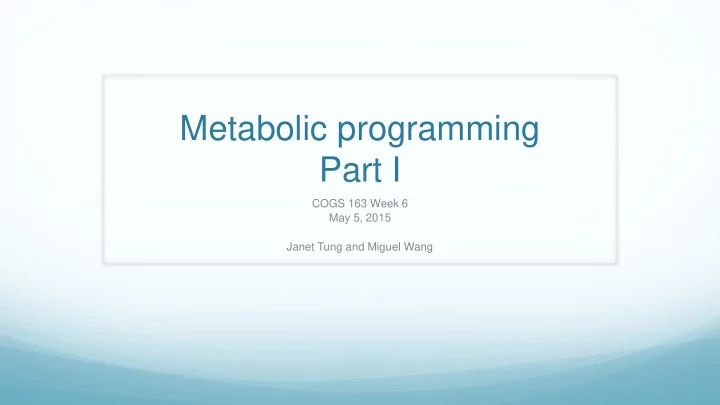

Metabolic programming Part I COGS 163 Week 6 May 5, 2015 Janet Tung and Miguel Wang
You are what your mom eats…? Does maternal diet matter? What effects does it have? How? When? Are these effects reversible?
2013: 1990: 35% obese 10-15% obese Childhood obesity: 17% (tripled since 1980) Diabetes: 9.3% (29 million people) www.stateofobesity.org
Pregnancy rates of obesity and diabetes Maternal obesity: 15-40% Maternal diabetes: 3-10% Gestational diabetes: 7-18 % In humans: offspring of obese, diabetic, and hyperglycemic mothers Increased risk of metabolic disorders
Metabolic programming What’s the mechanism?
Mechanism: Hypothalamic circuitry Neonatal Insulin Action Impairs Hypothalamic Neurocircuit Formation in Response to Maternal High-Fat Feeding Vogt, et al., Cell (2014) www.examiner.com
Previous studies showed: • Gross changes in hypothalamic neurocircuits • Differential neuropeptide expression • Altered hypothalamic neuronal cell numbers • Impaired formation of hypothalamic axonal projections Timing? Molecular mechanisms? From Adena and Andrea’s presentation
Developing a mouse model Differential developmental course than humans Mouse: In utero: neuronal cells numbers are determined Lactation: formation of functional neuronal networks, including ontogeny of axonal projections and synaptic connections
Experiment design: Timing of diet NC or Maternal HF Pregestation, Prenatal Maternal NC HF Postnatal Offspring NC HF NC HF 8-12 weeks
Results: timing HFD during Lactation = Elevated serum insulin
Results: mechanisms 1. Markers of predisposition to metabolic disorders 2. Effects on hypothalamic circuitry 3. Axonal projections of ARC neurons to downstream sites 4. Role of insulin signaling in offspring predisposition to metabolic disorders 5. Can predisposition be ameliorated by eliminating POMC insulin receptors? 6. Effects on pancreatic βcells
1. Offspring risk of metabolic disorders “Exposure of mothers to HFD exclusively during the lactation phase exerts the strongest effects on alterations in energy and glucose homeostasis in offspring.”
2. Offspring hypothalamic circuits ARC mRNA expression of POMC, AGRP, NPY: no difference PVN expression of thyrotropine-releasing hormone (TRH): lower Hypothalamic mRNA expression of inflammatory markers: no difference ARC neuron cell numbers: no difference POMC processing to αMSH: no difference POMC neuron spontaneous firing rate, resting membrane potential, and synaptic input: no difference
2. Offspring hypothalamic circuits ARC mRNA expression of POMC, AGRP, NPY: no difference PVN expression of thyrotropine-releasing hormone (TRH): lower Hypothalamic mRNA expression of inflammatory markers: no difference ARC neuron cell numbers: no difference POMC processing to αMSH: no difference POMC neuron spontaneous firing rate, resting membrane potential, and synaptic input: no difference
Thyrotropine releasing hormone (TRH) α -MSH exerts anorexigenic functions in part by upregulating TRH
TRH regulation
“Offspring of undernourished mothers share several metabolic impairments with offspring with obese mothers…and decreased pancreatic parasympathetic activity” But – no detected differences in classical markers for inflammation
3. ARC neuron projections to downstream sites in hypothalamus Three main downstream sites for projections from ARC: PVN – posterior (preautonomic) PVN – anterior (neuroendocrine, including TRH) DMH LA Robust reductions in αMSH and AgRP neuronal fiber densities in NCD/HFD offspring in all areas
Axonal fiber densities
4. Role of POMC insulin signaling Hyperinsulin- Increased HFD during emia in glucose and lactation offspring at 3 insulin in milk weeks POMC neuron IR
Role of POMC insulin signaling on predisposition to metabolic disorders NCD/NCD vs. NCD/HFD NCD/HFD vs. NCD/HFD/POMC IR ko Body weight: no difference No differences Adiposity: higher in NCD/HFD Except IR knockout rescues glucose ? intolerance Leptin levels: higher in NCD/HFD Insulin sensitivity: impaired in NCD/HFD (insulin tolerance test and HOMA-IR) POMC insulin receptor knockout during lactation improves insulin signaling What other players? Leptin – role in gestational diet
Effects of POMC IR knockout
5. Effect of POMC IR on axonal projections to PVN αMSH axonal projections AgRP axonal projections PVN anterior: no difference PVN anterior: no difference PVN posterior: rescue PVN posterior: no difference DMH: no difference DMH: no difference LA: no difference LA: no difference Hyperinsulinemia during lactation impairs POMC axonal growth to posterior (preautonomic) PVN
6. Effect of POMC IR knockout on pancreatic βcells Vesicular ACh transporter (vAChT) vAChT buttons per islet area: greatly reduced by NCD/HFD offspring Rescued by POMC IR knockout Glucose stimulated insulin secretion decreased in NCD/HFD offspring Rescued by POMC IR knockout (But impairments not seen with L- arginine stimulation, GLP-1, or FFA) No difference in βcell mass or islet size
Summary Lactation is most sensitive dietary period for offspring predisposition to metabolic disorders HFD during lactation impairs ARC innervation of intrahypothalamic target areas (recall mouse cross fostering experiments) Critical period: not reversible by reverting to normal chow after 8 weeks POMC IR signaling not critical under normal development conditions POMC IR knockout rescue of second order axonal projections is site-specific to posterior PVN Other mechanisms must contribute to impaired axonal projections to other areas (leptin, FFAs, et al.) HFD-induced reduction of pancreatic vagus innervation rescued by POMC IR knockout
Recommend
More recommend